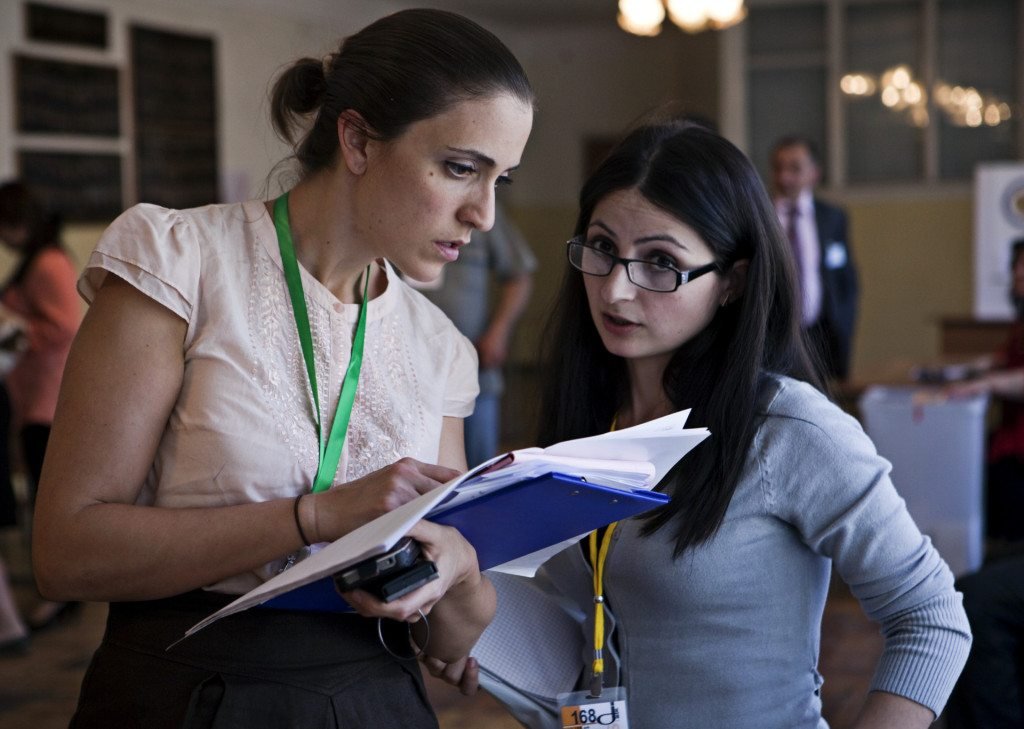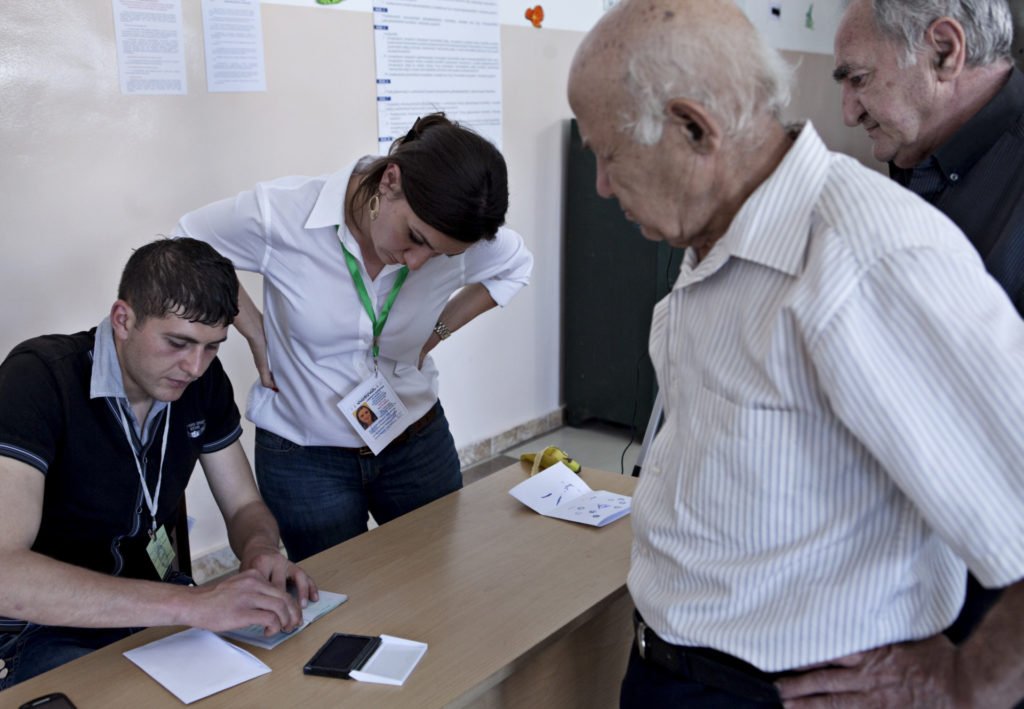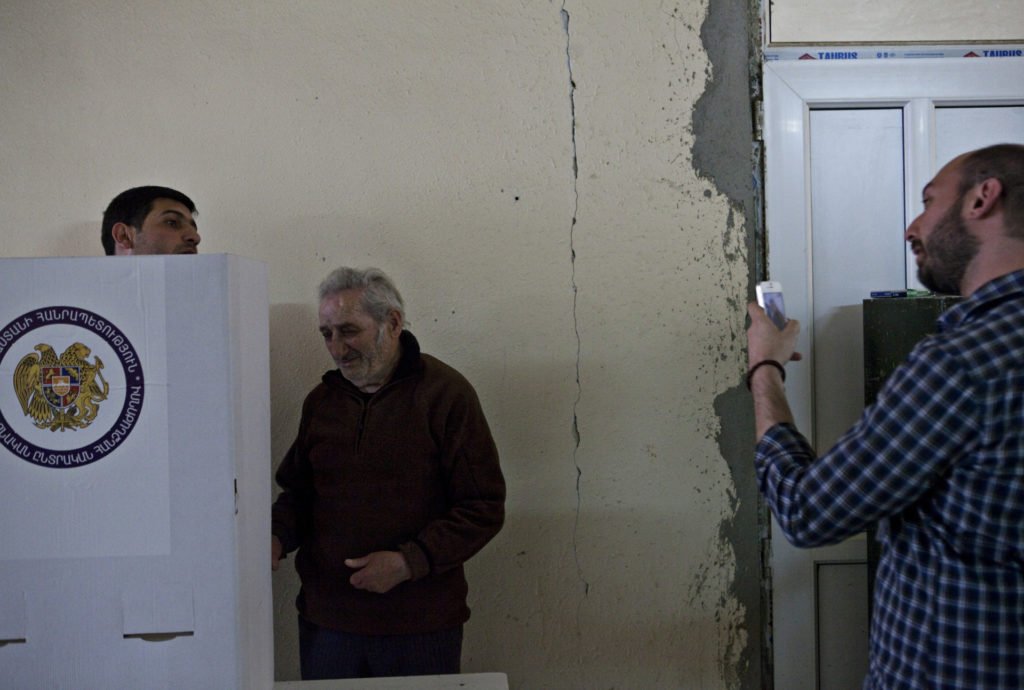By Sara Anjargolian and Ursula Kazarian
Photos by Eric Grigorian
As reports of irregularities during the Yerevan municipal election continue to make headlines in the media, members of a joint local-diaspora monitoring team, which exceeded 100 people, are nevertheless optimistic about the level of engagement and partnership between local organizations and diaspora resources.

The effort, which was the first of its kind, encouraged local monitors and provided a unique avenue of engagement for diasporans. From the opening of the polls at 8 a.m. to the end of the vote count, which stretched well past midnight at many precincts, diasporans stood alongside local monitors to deter fraud and to record any irregularities.
Each two-member team was equipped with video cameras and trained in their legal right under the Armenian Electoral Code to photograph and make video recordings. Specifically, the diaspora team chose to deploy its monitors to what have become recognized as Yerevan’s “hot spots,” in District 7 (Sebastia-Malatia) and District 13 (Nubarashen), both of which are known to be heavily influenced and controlled by local oligarchs.
Violations reported across precincts
Observed violations included threats of physical harm and damage to property; routine dismissal by election commission members of violations observed and reported by monitors; what appeared to be premeditated and organized chaos, aided by commission members, with the apparent intent to distract observers and/or to infringe on their right to film and photograph the proceedings; and an overwhelming number of “helpers,” or people designated to assist those who may be physically unable to vote alone.

“Helpers” are allowed under the Armenian Electoral Code; however, according to many local and diasporan monitors, most of these “helpers” were not occasional individuals helping family members or friends, but instead arrived in parallel with busloads of mostly elderly voters as part of what appeared to be an orchestrated strategy.
Diasporan repatriate Babken Der Grigorian, who was monitoring polling station 7/15 with his partner Paola Guevara, reported that more than 70 “helpers” were registered to escort blind, disabled, or otherwise infirm voters at his polling place.
At Precinct 7/28, where diasporan repatriates Pedro Zarokian and Armen Kupelian were stationed, individuals registered as “observers” under shell NGOs caused ongoing commotion and often obstructed the legitimate monitors’ ability to record violations, some of which were committed by the precinct’s electoral commission chair. Zarokian also reported voter intimidation, which included roving gangs of men who congregated in front of the polling station and seemed to be responsible for “delivering” votes.
New form of diasporan involvement?
Despite a long day full of these challenges, most diasporans involved in the monitoring mission felt inspired and energized by the experience. Such was the case for repatriates Nairi Hakhverdi and Paula Der Matoian, who were stationed together at Precinct 7/14 and managed to capture some of the chaos that took place inside the precinct on video. After the polls closed, Hakhverdi remarked, “I can honestly say that we made a difference at our polling station. Simply getting the chairman to comply with the electoral code was enough to keep fraudsters on their toes. We couldn’t prevent suspicious voting completely, but we certainly got proxies and commission members sweating!”
Diasporan Rouben Galichian, who was deployed to Precinct 7/18, shared a similar sentiment: “I enjoyed it and think that our presence, badges, and the cameras did affect the voters’ and the committee members’ attitude and behavior. They all seemed to be more careful and on their toes. I will happily do it again.”






It does not look like a fair election to me. I don’t understand why this article says that some people are “positive” about it. I myself an “positive” it was fraudulent. It reminds me of how the Democrats used to stuff the ballot boxes in Chicago. They probably still do.
Even if the Armenian observers prevented some fraud at the polls, what about after? Are the ballot boxes protected? By whom? Are they counted correctly? Are they counted at all?
And what about people being bribed to vote?
“and managed to capture some of the chaos that took place inside the precinct on video.” – I did not see any chaos in this video. There is an argument provoked by “the observer” trained and equipped with a camera by Soros foundation. The purpose is very simple – divide Armenians along many fault lines. Some of the heroic observers are trapped in the arguments of preventive medicine – they want to believe that their presence prevented major imagined violations.
well said.
it is quite revealing that these ‘Diaspora Monitors’ are doing their ‘civic duty’ in safe, secure Yerevan.
How about going to the LOC for a couple of months and ‘monitoring’ the real enemies of Armenia.
Arthur, do you have evidence that anyone in the video is paid by Soros? Those who accuse our brothers and sisters in Armenia who try to make positive change as “foreign agents” are actually doing the dividing. And when the regime in Armenia denies our people the right to change their government, we all need to do some “division”—we need to “divide” from the regime’s corrupt system and unite against it, in order to make Armenia the kind of country that our people deserve and want to live in.
.
Calls for “unity” are usually made by authoritarian regimes and their supporters. The goal is not to truly unite but to suppress the critics. And it does not achieve unity, but only alienates part of the population.
The region is on the verge of a major global war and we still have our fools splitting hairs and throwing temper-tantrums. This political illiteracy and hysteria of Armenians is probably why we didn’t have an Armenia for one thousand years.
I am so tired of Diaspora’s nonsense, I’m so tired of Armenia’s Western led political opposition.
BRAVO Harutik!
It’s clear that we have not learned from the grave mistakes of our forefathers. Anyone that works against the Armenian state regardless of reason should be considered a traitor to Armenia. Despite all the odds stacked against it Armenia is doing just fine. The problems we have are normal growing problems and will take care of themselves in time.
Hey guys, Gurgen and Harutik, you think you are free of the “hysteria” you are so fervently condemning? Cool down. Armenia may be doing just fine, but calling critics for whatever reason “traitors” is a familiar cheap demagogy. No one,”western led”! or “eastern led”, has the monopoly of loving and serving his country.